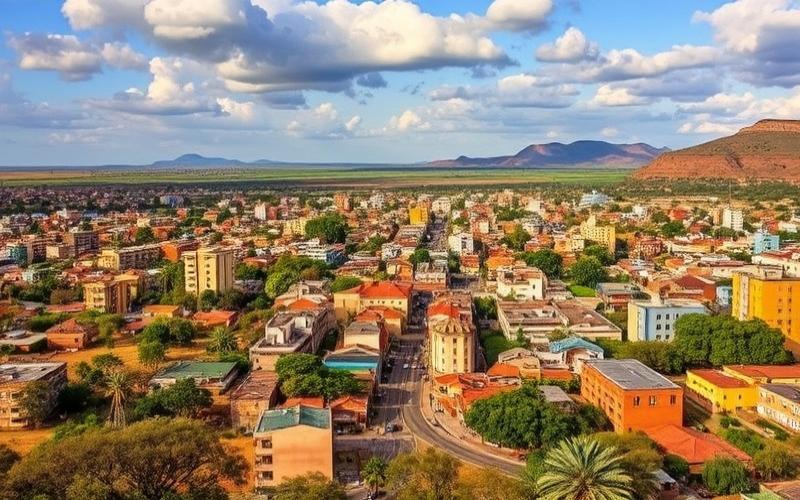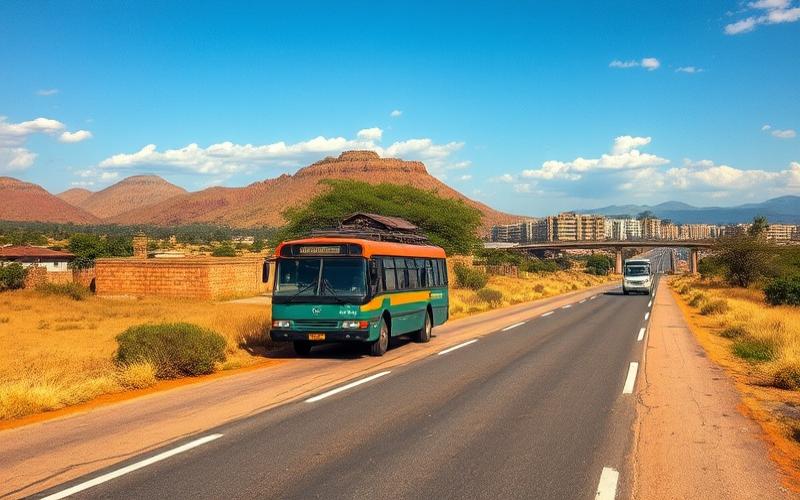
 Published on and written by Cyril Jarnias
Published on and written by Cyril Jarnias
South Africa, with its breathtaking landscapes, rich cultural diversity, and economic dynamism, attracts numerous expatriates each year seeking new adventures. However, settling there is not without challenges, requiring a thorough understanding of local laws, the real estate market, and professional opportunities.
Whether you’re drawn to vibrant metropolises like Johannesburg or the coastal charm of Cape Town, this article will guide you through all the essential steps for a successful relocation. From administrative procedures to tips for integrating into the local community, discover the keys to making your move to South Africa a rewarding and successful experience.
Essentials Before Departure
Visa and Residence Permit
- A visa is mandatory for any stay exceeding 90 days or for engaging in professional activities, studying, or investing.
- The visa application must be submitted before departure at the nearest South African embassy or consulate.
- For tourist or business stays under 90 days, many nationals (including EU citizens) are exempt, but a temporary residence permit is issued upon arrival.
- It’s impossible to convert a visitor visa to a work visa on-site; any changes require a new application from your home country.
- Expect lengthy administrative processes and varying requirements depending on the case. Consulting an immigration professional is recommended.
Procedures for Importing Personal Belongings
- Check the list of items permitted for import (restrictions apply to certain food, plant, animal products, etc.).
- Complete customs formalities before shipping and upon arrival.
- Keep invoices and detailed inventories.
- Declare any amount exceeding the equivalent of 10,000 USD in cash when entering the country.
Health Situation and Recommended Vaccinations
- No mandatory vaccines except for yellow fever for travelers coming from at-risk areas.
- Recommended vaccines: diphtheria-tetanus-polio (DTP), hepatitis A and B, typhoid, rabies (for extended stays or rural areas), meningitis, tuberculosis.
- Risk of malaria in certain regions (notably the northeast, Kruger Park): antimalarial prophylaxis advised.
- The private healthcare system is of good quality but expensive.
Insurance
- International health insurance strongly recommended, including medical evacuation.
- Liability insurance recommended.
- Car insurance mandatory if driving locally.
Important Documents to Bring
- Passport (valid for at least 30 days beyond the intended return date, with at least two blank pages)
- Visa/residence permit obtained before departure if necessary
- Vaccination record (especially if vaccinated against yellow fever)
- Insurance policies (health, home, auto)
- Return flight tickets or proof of sufficient funds for the stay
- Certified copies of civil status documents (birth, marriage certificates, etc.)
- International driver’s license or official translation
- Recent bank statements
Practical Tips: Local Culture and Language
- English is widely used, but there are 11 official languages, including Afrikaans and Zulu.
- Punctuality may be more flexible than in Europe but is still appreciated in professional settings.
- Hierarchical relationships are pronounced; respect for titles and positions is important.
- Cultural diversity is strong: familiarize yourself with local customs depending on the region.
- Tipping is expected (around 10% in restaurants).
Financial Aspects
- Opening a bank account is possible with a valid visa, proof of address, and passport.
- Allow time for the procedure (several days to a few weeks).
- Banks often require a permanent address and a letter from the employer.
- The local currency is the South African rand (ZAR).
- Currency exchange offices are available in major cities and airports, but banks offer better rates.
- Card payments are widely accepted.
Safety Measures
- Take precautions against petty crime: avoid displaying valuables, do not walk alone at night in large cities.
- Prefer official transportation (taxis, ride-sharing services).
- Always lock doors and windows at home and in your vehicle.
- Be vigilant when withdrawing cash.
- Research neighborhoods to avoid in different cities.
| Theme | Key Points to Remember |
|---|---|
| Visa & Stay | Visa required for >90 days or professional activity; apply before departure; not convertible on-site. |
| Importing Goods | Customs formalities, restrictions on certain products, declaration of large sums. |
| Health | Recommended vaccines (DTP, hepatitis, typhoid, yellow fever depending on origin), malaria prophylaxis, international health insurance necessary. |
| Insurance | International health, evacuation, liability, auto. |
| Documents | Passport, visa, vaccination record, insurance policies, civil status documents, international license, bank statements. |
| Culture/Practice | English common, linguistic diversity, respect for hierarchy, tipping, adaptation to local customs. |
| Finance | Bank account with visa and proof, currency: rand, exchange at banks, cards widely accepted. |
| Safety | Precautions against crime, avoid walking at night, vigilance in risky areas, secure home and vehicle. |
Good to Know:
Check visa and residence permit requirements before departure and ensure you have all essential documents like your passport, insurance certificate, and up-to-date vaccinations; for banking matters, opening a local account can simplify currency conversion.
First Steps in South Africa
Overview of arrival formalities:
- Passport: Must be valid for at least 30 days beyond the intended departure date and have at least two blank pages. This requirement is strictly enforced.
- Visa: Not required for tourist or business stays under 90 days for many nationalities. A temporary residence permit is issued upon entry. For any other type of stay (work, study, residence), it is imperative to obtain the appropriate visa before departure.
- Traveling with minor children: Present documents proving parentage (birth certificate, parental authorization if the child travels with one parent, etc.), translated into English. Additional requirements apply for unaccompanied minors (consent letters, contact details and documents of the local guardian, etc.).
Essential first steps:
- Open a bank account: Provide proof of address, passport, valid visa, and sometimes an employer letter. Prefer major South African banks to facilitate the process.
- Find housing: Several options are available:
- Temporary rental (Airbnb, hotels, serviced apartments) for the settling-in period.
- Search for permanent housing via real estate agencies, online platforms, or local networks.
- Lease signing: expect a deposit equivalent to one or two months’ rent, proof of identity and income.
- Enroll children in school:
- Registration in a public or private school.
- Provide previous school reports, passport, visa, and sometimes proof of vaccination.
- Plan ahead, as some private schools are in high demand.
Cultural specifics and practical tips:
- Languages: English is the most used language in administration and business, but eleven official languages coexist. Adapting to the local accent and learning basic words in Afrikaans or Zulu can ease integration.
- Climate: South Africa experiences reversed seasons compared to the northern hemisphere. Adapt your wardrobe: hot and sometimes rainy summers, mild but cool winters, especially in the morning and evening.
- Transportation:
- Car is the primary mode of transport (drive on the left, international license often required).
- Public transport is limited, especially outside major cities.
- Use recommended ride-sharing apps or taxis for greater safety.
- Culture and integration:
- Adopt a respectful, open, and tolerant attitude towards cultural and racial diversity.
- Be punctual and professional in the workplace.
- Learn about local customs (greetings, hierarchical relationships, social life).
Potential challenges and solutions:
| Main Challenge | Tips to Overcome It |
|---|---|
| Slow administrative procedures | Plan ahead, keep all proofs, rely on expatriates or local professionals |
| Cultural differences | Participate in local events, join expat groups, learn basic cultural and linguistic elements |
| Safety | Be vigilant when moving around, choose housing in a safe neighborhood, follow authorities’ recommendations |
| Social isolation | Join clubs, associations, professional and community networks |
| Climate adaptation | Adjust clothing habits, protect health during heatwaves or droughts |
Some practical tips:
- Take out international or local health insurance upon arrival.
- Always have copies of important documents (passport, visa, insurance).
- Research neighborhoods before renting or buying a home.
- Budget for initial setup costs (deposit, account opening, transport, etc.).
- Use expat support groups for concrete and up-to-date advice.
Moving to South Africa requires anticipation, open-mindedness, and adaptation to cultural and practical differences. Thorough preparation greatly facilitates the transition and integration.
Good to Know:
To integrate smoothly in South Africa, familiarize yourself with local customs and plan to open a bank account quickly; be mindful of cultural and climatic nuances that may be surprising.
Integrating and Building Local Connections
Expatriate integration in South Africa relies on openness to cultural diversity, understanding local customs, and developing a varied social network. The country stands out for its mosaic of cultures, languages, and traditions, a legacy of a complex history marked by apartheid and great ethnic diversity.
| Key Aspect | Practical Tips |
| Cultural understanding | Learn about local practices (greetings, sharing meals, festivals) |
| Respect for traditions | Observe cultural differences in daily life with respect |
| Linguistic diversity | Learn English (dominant language) and basics of Zulu or other languages |
| Networking | Build connections with expatriates AND South Africans to open up to diverse perspectives |
Actively participating in local life promotes integration:
- Taking part in community events or festivals allows you to discover local customs while meeting residents.
- Joining sports clubs, cultural associations, or volunteer groups facilitates contact with different communities.
- Using community resources (expat support groups on social networks, municipal welcome services).
Engaging in these activities offers several benefits:
- Enriching discovery of South African daily life
- Accelerated language learning through regular interactions
- Rapid development of a sense of belonging
Networking with other expatriates is also valuable:
- Sharing common experiences facilitates moral support
- Exchanging practical advice related to local administrative or professional life
However, it’s essential not to remain solely among expatriates to avoid community isolation. Creating connections with South Africans allows for better adaptation and understanding of the local context.
Key tips for establishing lasting relationships:
- Adopt a patient attitude: integrating into a new country takes time.
- Show cultural sensitivity in the face of sometimes marked differences.
- Keep an open mind during intercultural encounters.
Openness to dialogue, mutual respect, and a genuine willingness to understand your new environment are essential for building a strong network – an indispensable foundation for successful social integration in South Africa.
Good to Know:
Participate in community events to better understand South African cultural diversity, and consider learning English and Zulu to enrich your interactions. Joining local clubs and networking with expatriates and South Africans will help you build strong and lasting relationships.
Mastering Legal and Administrative Procedures
Overview of Visas and Work Permits for Expatriates
- Tourist visa: valid for up to 90 days for nationals of certain countries, including France.
- Long-stay visa: required for any stay over 90 days, including for work, study, or investment.
- Work permit: different types exist depending on the purpose (employed work, business creation, investment).
- Starting September 2025: introduction of the ETA system (electronic authorization), simplifying online applications for tourist visas.
| Type of Visa/Permit | Purpose | Maximum Duration | Where to Apply? |
|---|---|---|---|
| Tourist | Visit/leisure | 90 days | Online / border (depending on nationality) |
| Employed Work | Local employment | According to contract | Embassy/consulate before departure |
| Study | University/school | According to program | Embassy/consulate before departure |
| Investment | Business creation or purchase | Variable | Embassy/consulate before departure |
Steps and Required Supporting Documents
- Check visa necessity based on nationality and project.
- Prepare a file at the South African consulate or embassy:
- Completed official form
- Passport valid at least 30 days beyond intended departure date
- Recent ID photos
- Proof of employment or signed local contract (for work permit)
- Financial proofs
- International health insurance covering the entire stay
- Schedule an appointment and submit the file in person; no visa is issued upon arrival.
Procedures After Arrival
- Register with local services (“Home Affairs”) within the specified timeframe according to the visa type obtained.
- Request an extension if necessary only from within South Africa (possible under conditions).
- Verify that the entry stamp matches the granted duration; any violation may lead to future bans.
Tax Obligations for Expatriates
Expatriates are subject to the following tax obligations:
- Annual declaration of income earned locally.
- Compliance with any bilateral agreements to avoid double taxation.
Practical list:
- Keep all proofs related to salary earned in South Africa.
- Inquire about your tax status upon installation with the South African Revenue Service (SARS).
Importance of Local Laws
Know:
The rules concerning:
- Employment: strict local contracts, specific social rights
- Housing: written lease mandatory, legal deposit limited
- Daily life: strict adherence to anti-corruption and anti-discrimination laws
- Immigration: mandatory reporting in case of address change
To facilitate your administrative procedures:
- Always prepare certified copies translated if needed;
- Regularly consult the official “Department of Home Affairs” website;
- Plan your applications well in advance – processing times can be long;
- Use specialized services or local lawyers if your situation is complex;
- Keep all original official documents and their secure digital copies;
Mastering these procedures ensures a smooth legal settlement and avoids any future administrative risks.
Good to Know:
For a peaceful stay in South Africa, ensure you obtain a visa or work permit suited to your situation, gathering all necessary supporting documents, including proof of employment and sufficient financial resources. After arrival, remember to register with local authorities and inform yourself about tax laws and those governing employment and housing; consulting a local advisor can be helpful in navigating these complex procedures.
Disclaimer: The information provided on this website is for informational purposes only and does not constitute financial, legal, or professional advice. We encourage you to consult qualified experts before making any investment, real estate, or expatriation decisions. Although we strive to maintain up-to-date and accurate information, we do not guarantee the completeness, accuracy, or timeliness of the proposed content. As investment and expatriation involve risks, we disclaim any liability for potential losses or damages arising from the use of this site. Your use of this site confirms your acceptance of these terms and your understanding of the associated risks.

























































